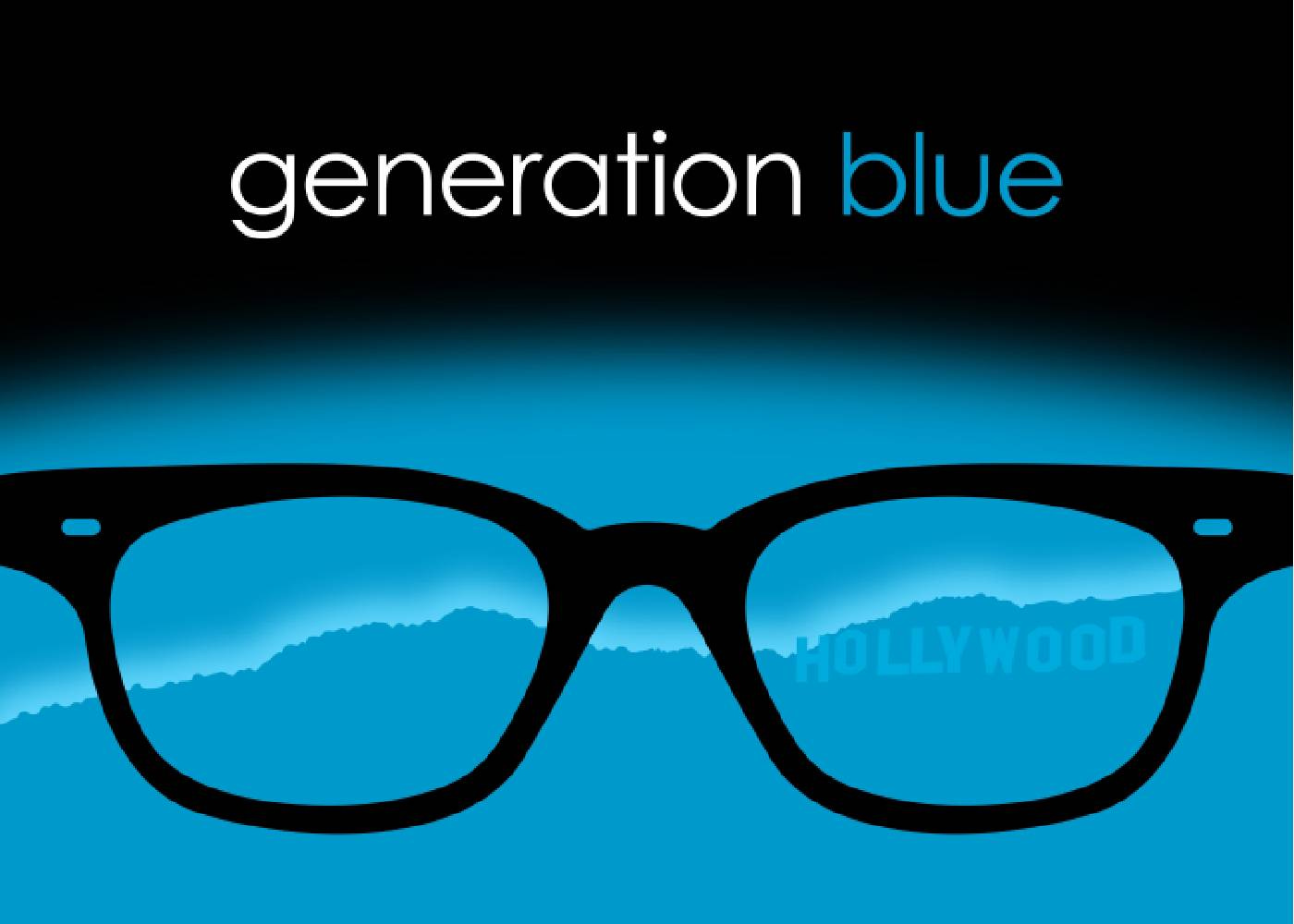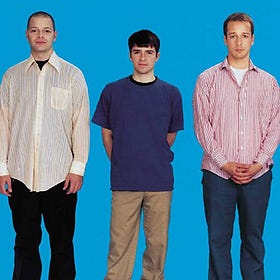'The Geeks Shall Inherit The Earth' (Part 3)
Exclusive Quotes From The 'Generation Blue' Oral History
In the two previous installments of this series, we discussed the powerful influence Weezer’s debut album and Return of the Rentals had on the Hollywood music scene in the ‘90s and early 2000s.
Less than 5 years after hair metal ruled the Sunset Strip and dominated most music conversations around town, a transformation took place across stages at Whisky a Go Go, Coconut Teaszer, The Viper Room and other fabled Hollywood haunts.
Teased locks, spandex and studded leather were slowly replaced with short hair, soccer jerseys and glasses (a timeless symbol of geeky rock and roll outsiderness if there ever was one—Buddy Holly > Mark Mothersbaugh > Elvis Costello > Milo Aukerman > Rivers Cuomo > The Rentals > countless artists in the ‘90s and beyond.
It wasn’t a straight line from hair metal to Geek Rock—other important bands like Jane’s Addiction, and subgenres like grunge were important catalysts—but by the mid-’90s the momentum was undeniable.
While Weezer, and later The Rentals, toured the alternative rock universe, newer Hollywood bands that took cues from their songwriting, sound and aesthetic filled the void. That included Adam Orth and Justin Fisher of Shufflepuck who grew up playing music with Cuomo in Connecticut, as well as Kevin Ridel of Lunchbox/Ridel High who previously sang for Cuomo’s heavy metal band Avant Grade (aka Zoom).
Meanwhile, other musicians who came up in the clubs alongside Weezer—like Jon Pikus of El Magnifico/Campfire Girls, Rod Cervera of Magpie/Supersport 2000, Adam Marsland of The Adam Marsland Band/Cockeyed Ghost, and many others—made elements of the Weezer blueprint their own. Those bands were followed by a second, younger wave featuring Ozma, Phantom Planet and Rooney, among many others.
Hollywood Geek Rock thrived throughout the ‘90s and into the early 2000s.
It definitely wasn’t the only scene around town, but it was hard for bookers, fans and A&R reps to ignore the groundswell Weezer and The Rentals created. The momentum was amplified by two annual pop music festivals: First came Poptopia in the ‘90s, followed by International Pop Overthrow (celebrating its 25th anniversary this year).
“(W)henever we were in town between tours in the months and years following that initial success, it was more and more obvious that the scene was rapidly changing, creating something beautiful that was unrecognizable to anyone who remembered what it was like just a few years earlier,” Karl Koch writes in the foreword to Generation Blue: An Oral History of The Hollywood Geek Rock Scene in the 1990s & 2000s.
Koch, who is often referred to as the “fifth member of Weezer,” has been with the band since the very beginning, holding a number of critical behind-the-scenes roles to this day including photographer, webmaster, historian, archivist and president of the legendary Weezer Fan Club.
“This fragile thing that we had built and nurtured in a Westside garage had taken on a life of its own and produced some truly fantastic music, much of which is featured on the compilation that accompanies this oral history.”
The Generation Blue vinyl compilation is the soundtrack to the oral history, featuring 11 tracks by ‘90s and early 2000s Hollywood bands:
Side One 1. Shufflepuck—Where The Hell Is She 2. Baby Lemonade—Pop Tarte 3. Supersport 2000—Mooks 4. Campfire Girls—Broken Tooth (DeLongpre Version) 5. Cockeyed Ghost—Keep The Sun (Demo) 6. Chopper One—Touch My Fuzz (2024) Side Two 1. Nerf Herder—We Opened For Weezer 2. Ridel High—Self Destructive (Demo) 3. Ozma—No One Needs To Know 4. Psoma—Never The Same 5. AM Radio—Hush
We soft launched the Generation Blue project a week ago at Add To Wantlist with an archival footage video for Shufflepuck’s lost hit “Where The Hell is She?” It was put together by Paul Convington, veteran film editor and author of the literary rock and roll thriller Last Song of the Deathbirds.
This project took many twists and turns along the way, but I’m proud of the book and compilation that finally emerged. It’s a huge love letter to a long gone scene, the bands that inspired it, the music that emerged, and many key players.
Introducing Generation Blue.
Big thanks to everybody who spoke with me for oral history; Karl Koch for the foreword, and Justin Fisher for the afterword (and to both of them for their steady feedback and guidance all along); all the bands on the compilation; John M. Borack for copy editing; John Lathrop for graphic design; and to Big Stir Records and SpyderPop Records for bringing it out into the world.
It would have been impossible for me to interview every band member and mention everybody who was part of the scene back then, so the oral history serves as an overview that mainly revolves around many of the musicians on the compilation. But who knows? Maybe there could be a follow up to this project down the road.
If you’re new to this classic Hollywood scene, I’m guessing these 11 tracks and the connected stories will lead you to even more great music. And if you were there, I hope the Generation Blue oral history book and vinyl compilation reminds you of this long-gone moment that gave us some fantastic albums and songs.
Here are a few favorite quotes from Generation Blue:
Adam Orth (Shufflepuck): My first night in LA was wild. I had a two-week roundtrip ticket. I got off the plane and Justin (Fisher) was waiting for me at the gate and said, ‘We’re going to see Weezer.’ He brought me from LAX to Jabberjaw. Rivers had a giant mustache and they’re all wearing the blue-striped shirts like the Beach Boys. Then they took me to the Amherst House after the show for the first time…I was hooked, that was it.
Rachel Haden (That Dog): I didn't know if we actually fit together because we weren't as poppy. Weezer just sounded like a really accessible band and I felt like That Dog wasn't as pop and wouldn't reach as many people. I always thought of Weezer as a bunch of nerds.
Parry Gripp (Nerf Herder): Around that time Nerf Herder got together, Steve and I went to Marko DeSantis’ twenty-second birthday party at Alex’s Cantina and the bands playing were Green Thumb, which had Chris Shifllett (later of Foo Fighters), Wax and Weezer. It was right after the Blue Album came out, and there’s Rivers up there with a bowl cut and thick glasses and he’s singing ‘In the Garage’ about his twelve-sided die and his dungeon master’s guide and I was like ‘Oh, wow! This guy is me. He’s singing about something I could relate to.
Daniel Brummel (Ozma): Geek Rock might be the beginning of the death of the bloated male rock star archetypes that dominated the '70s and '80s. It was a new kind of rock and roll where you didn't have to be glammed-out and flamboyant like David Bowie... You could just be yourself, which was so liberating. They gave us the sense that anyone could do it—so we did.
Kevin Ridel (Luchbox/Ridel High/AM Radio): Most of the stuff I’ve ever done is contrived. You just sit down and decide you’re going to do ‘this, this and this.’ Here’s how we need to look to do this, now let’s go get the clothes. ‘Oh. You get this kind of clothes at the thrift store and it’s dirt cheap? Even better.’ Heavy metal clothes were expensive, dude. I didn’t have to pay $50 for fishnet shirts any more. Used slacks for two bucks? Awesome.
J.C. Brandy (Lunchbox/Lo-Ball): Successful artists have the power to redefine what is cool and what is not. Geek Rock is a great example of that and how art defines the times.
Justin Fisher (Shufflepuck/Nerf Herder/Psoma): It really helped us get into clubs in the beginning because Weezer introduced us to the main bookers around LA. They couldn’t book Weezer anymore, so we were able to say ‘We’d love to play that slot and we’ll bring some of (Weezer’s crowd) back.’ That came from Matt Sharp making those introductions. It definitely helped us, but it also helped the scene that Weezer built to continue.
Linus of Hollywood (Size 14/Nerf Herder): The blueprint for Size 14 was one hundred percent Weezer and all of the other relevant bands from that scene. When I first moved to LA, Monday nights at the Whisky was a show called Bianca's Hole. It was free and you would go see Red Five, Chopper One, That Dog, Campfire Girls, Shufflepuck and Ridel High. I just fucking loved all that shit. So, Size 14 is just an amalgamation of all that stuff.
Matt Sharp (Weezer/The Rentals): It was funny to think about turning that raw Rentals’ record into something more orchestral. But we didn't have any more tracks available, so I bought a Tascam digital tape machine that you could sync up to the Grimley’s analog tape machine. That’s when we started going, ‘Okay, how do we make this into an ELO record?’
Adam Marsland (Cockeyed Ghost): There had been attempts to ‘make a scene’ before, but it always fell apart because somebody didn’t pull their weight. This had to be about enlightened self-interest—you had to create something that made it worth people’s while for their own reasons. So, the more bands we brought in and the more broadly we defined this ‘pop thing,’ the more interesting the scene was going to be.
Once that ball got rolling, it created its own momentum.
Free/All Ages Launch Party In Los Angeles—April 28th
Is Weezer Power Pop?
Weezer’s self-titled debut album—known affectionately as the Blue Album by generations of fans—turned 29 this month. To celebrate, Paul Myers and I wanted to share Daniel Brummel’s excellent exploration of these 10 legendary tracks through a power pop lens. This essay originally appeared in









This is really impressive. Can't wait to check out the complete thing.
I've been trying to wrangle together a similar compilation of the Chicago pop-rock sound from 1976-1990. But there are a lot of tracks I'd have to license from major labels - everyone was convinced the scene was going to break big - and it's just a dauting task for someone who really doesn't have any background in compilations.
So congrats on this. It looks great and there are a lot of tracks I'm not familiar with.
Congrats! Some new-to-me bands here I'm looking forward to checking out. That Shufflepuck track is awesome!